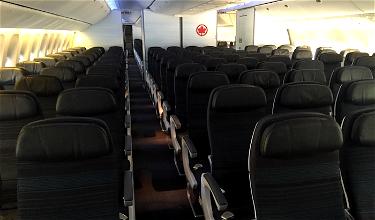Yesterday YouTuber Wendover Productions uploaded a great video explaining the economics of airline classes. It explains why airlines make most of their money in business class, the history of airlines’ various classes, and more.
I think this is a really great explanation for a wide audience. Sure, there’s a bit more to this and it doesn’t get into everything, but for a 10 minute video targeted at someone with no knowledge of the airline industry, this is extraordinarily well done. The video was just uploaded yesterday and already has over 675,000 views, which is especially impressive for a video about airlines.
Here’s the video, which I hope some of you will find interesting:
(Tip of the hat to Alon)





Why didn't anyone mention that this video was a gross oversimplification with several errors? Oh wait, almost everyone did. Some very insightful replies. I liked Roger's, but others, too.
Why was there no wine list?
I liked the idea of the video, though I thought it went on too long. Clearly it oversimplified some things, such as how wildly the price of a seat in in a cabin can vary. And its conclusion at the end that all of us in economy were "just there to fill the plane" didn't really make sense. After all, according to his logic, if economy wasn't profitable, airlines would get rid of it.
@Roger...
I liked the idea of the video, though I thought it went on too long. Clearly it oversimplified some things, such as how wildly the price of a seat in in a cabin can vary. And its conclusion at the end that all of us in economy were "just there to fill the plane" didn't really make sense. After all, according to his logic, if economy wasn't profitable, airlines would get rid of it.
@Roger fascinating post, thanks!
@Josh G. Not sure what you mean by your "experts" comment. Most of us here are just people who like to (or have to) fly, and are trying to make sense of a complex, confusing pricing system where key information is often withheld from the consumer. We "have no clue how things actually work" because your employer keeps them secret. If you have more insight than the rest of us, please share it here! I'd love to know more about how RM works. Alternatively, if your point is that working in RM makes you cooler than the rest of us...well that's pretty silly.
I really enjoy these videos.
What about Malindo Air and Thai Airways.?
@ Roger +1
Having also worked in RM this doesn't even scratch the surface. Of course FFs and observers (this blog being no exception) love thinking they're experts in our industry when they really have no clue how things actually work.
With improved segmentation capabilities, IATA NDC/Resolution 787, and next gen RM capabilities this video will be even more out of line.
I agree with many above. I don't necessarily disagree with his conclusion — I think he's at least somewhat in the ballpark — but I can't get over the complete disregard for fare buckets and revenue management in his example. Yes, I get it's supposed to be very simplified and for an audience that doesn't read blogs like this everyday, but the video implies that each passenger in the same cabin pays the same fare...
I agree with many above. I don't necessarily disagree with his conclusion — I think he's at least somewhat in the ballpark — but I can't get over the complete disregard for fare buckets and revenue management in his example. Yes, I get it's supposed to be very simplified and for an audience that doesn't read blogs like this everyday, but the video implies that each passenger in the same cabin pays the same fare or something close to it. The reality is that each sale can vary wildly depending on not just airline and O&D as was covered in the video, but also travel dates, advance purchase, Saturday night stay, corporate accounts, and so many other factors.
Going to the effort of looking up one economy fare on one route on one particular day, multiplying it by the number of Y seats on the plane, and repeating it for each cabin is *not* simple — it's just a very inaccurate presumption of how airlines make money. Fallacy of the single cause.
ilikelogic, Jordan, Roger - really good points (and Roger thanks for bringing your personal perspective).
We should take into account those videos should be simplified. However simplified doesn't mean taking one *very specific* case and making it axiom. Ever further I seriously doubt his calculations were true even for BA route IAD-LHR operated by 772. He quoted $900 for Y class ticket, however even for direct flights sale fare often drop to around $600 and...
ilikelogic, Jordan, Roger - really good points (and Roger thanks for bringing your personal perspective).
We should take into account those videos should be simplified. However simplified doesn't mean taking one *very specific* case and making it axiom. Ever further I seriously doubt his calculations were true even for BA route IAD-LHR operated by 772. He quoted $900 for Y class ticket, however even for direct flights sale fare often drop to around $600 and can get up to $2000-3000 closer to departure. He and we actually have no idea how many of seats are being sold at O fare and how many at YBH. Things getting worse with J, he quoted $6000 or $7000. Indeed it's a walk in fare. Discounted fares from the US start as low as $1500-2000 (so 3-4 times less than in his calculation), originating in the UK as low as $1200 (5 times less).
Add on. Besides a dozen airlines that have premium heavy configurations (and even among those airlines premium heavy aircraft are just a part of their fleet, e.g. 77W Air France could have between 14 and 80 J class seats), the wast majority of full service airlines operate configurations in proportion (+/-) 30 J to 200 Y.
@Lucky, considering all your great experience with flying around the World, I seriously wonder how comes this video is awesome.
@Martin while I agree first class is going away, you really would argue that business class on Virgin and Air New Zealand is better than First on Emirates, Qatar, Singapore, Cathay, Ethiad, Air France, and Lufthansa? I will give you two, American and British Airways, allthough honestly Americans hard product is significantly better than Virgin Upper class. Moral of the story don't make a statement that says "most" when that's not the case, it hurts...
@Martin while I agree first class is going away, you really would argue that business class on Virgin and Air New Zealand is better than First on Emirates, Qatar, Singapore, Cathay, Ethiad, Air France, and Lufthansa? I will give you two, American and British Airways, allthough honestly Americans hard product is significantly better than Virgin Upper class. Moral of the story don't make a statement that says "most" when that's not the case, it hurts your legitimate arguement.
If business and first made the money and coach didn't, we would see many successful all-premium airlines. The fact that there are far more successful low cost, all coach airlines than the (virtually no) successful premium airlines means to me, prima facie, that profit cannot simply come from the high cost customers.
Here I am paying 1,100 USD pp for EY J. Maa-auh-iAd-jfk-auh-maa
Having worked in Revenue Management, Pricing, and Route Planning at two major US carriers, I think the video was very over-simplified. It treats it like everyone pays full fare which isn't the case. As mentioned above, corporate discounts dilute the fares, and it fails to mention free upgrades from one cabin to the next, such as Y to J, would dilute the fare in the upgraded cabin even further. No one upgrades into coach so...
Having worked in Revenue Management, Pricing, and Route Planning at two major US carriers, I think the video was very over-simplified. It treats it like everyone pays full fare which isn't the case. As mentioned above, corporate discounts dilute the fares, and it fails to mention free upgrades from one cabin to the next, such as Y to J, would dilute the fare in the upgraded cabin even further. No one upgrades into coach so that average fare isn't diluted like other cabins. Load factors in coach tend to be higher on average and ten empty coach seats don't hurt the bottom line as much as ten empty business class seats. Coach passengers also pay significantly more in fees than those in upgraded cabins which is left out of this revenue model. BA is blessed in being based in London, one of the most premium traffic heavy cities in the world so that can drive demand for more First and Biz class seats, but that doesn't really apply to most airlines which is why many have more coach and a smaller Business Cabin. The narrowing gap between the quality of a business class seat and a first class seat is also diminishing the fare premium international first can command which was correctly pointed out in the video. Corporate travel policies can also drive demand in various cabins and many don't allow for purchase of First Class tickets except for the most senior of executives. Those policies also get tightened during recessions allowing for less upgraded tickets to be bought by business travelers or requiring a longer minimum flight time until it is eligible. If first and business was so valuable for US carriers, they wouldn't be ripping out the First Class cabin (non-rev class), shrinking business cabins on some planes, and packing in coach seats in the back, which in the end has been revenue positive in the US market.
ilikelogic, the video assumes that all seats are taken. That is often true for economy, but there are frequently empty seats in the premium cabins. airlines charge the most for last-minute premium travel and by holding back seats for that, they risk flying with empty seats.
That's also why you get a lot of upgrades, because the cheap seats are over-subscribed while the expensive ones are under-subscribed.
So the theoretical revenues inn the video can...
ilikelogic, the video assumes that all seats are taken. That is often true for economy, but there are frequently empty seats in the premium cabins. airlines charge the most for last-minute premium travel and by holding back seats for that, they risk flying with empty seats.
That's also why you get a lot of upgrades, because the cheap seats are over-subscribed while the expensive ones are under-subscribed.
So the theoretical revenues inn the video can be true while the actual revenues you describe can also be true
Espen, First is going the way of the dodo. Business is already better than First was 15-20 years ago and that will continue. The growth area is in what is now a larger gap between Economy and Business, hence the trend towards Premium Economy.
I doubt that many people will avoid an airline just because there is no F, even if they are not paying. Try Business on Virgin Atlantic or Air New Zealand. Better than F on most airlines that still operate it
In my opinion, it was a great video. Two things in response to the first class and the bunch of crap thing. If a person loyalty fails to an airline because he/she can not get first class, then what does that say about that person. You can not sit with the rest of the population that their ego has to put them into first class. Basically to people who wants to understand the basics of...
In my opinion, it was a great video. Two things in response to the first class and the bunch of crap thing. If a person loyalty fails to an airline because he/she can not get first class, then what does that say about that person. You can not sit with the rest of the population that their ego has to put them into first class. Basically to people who wants to understand the basics of how the airline makes money, it makes sense. Anyone who wants to read more into it and condemn the video is looking for something to make wrong.
@jetset and @Jordan - I agree with both of you, the content was interesting but far from being painted in the correct light. Semantics make a difference when you start spitting out percentages and such.
Awesome video??? Ummm its absolute crap...and this guy does not know what he is talking about. BA along with most other premium heavy carriers featuring Prem Y have stated on the record that this cabin is the most profitable over J.
His reasoning for why only 6 carriers offer F Class is sooooo laughable. His historical understanding of this cabin is completely off!
There is a route that can handle an all J class...
Awesome video??? Ummm its absolute crap...and this guy does not know what he is talking about. BA along with most other premium heavy carriers featuring Prem Y have stated on the record that this cabin is the most profitable over J.
His reasoning for why only 6 carriers offer F Class is sooooo laughable. His historical understanding of this cabin is completely off!
There is a route that can handle an all J class cabin, but those carriers failed for other reasons, but most certainly not for lack of demand. I guess BA's A318 all J does not exist in his mind.
Everyone in Y is just there to fill the plane??. Hmmm, tell that to VS and many others.
Cargo?
Don't waste your time watching this crap. This is exactly how we end up with a world full of clueless idiots.
Neat video, thanks for posting. As others have noted already, the financial numbers in the videos are oversimplified, but still useful for illustration purposes. Looks like many other interesting YouTube videos by Wendover are available also.
^edit - remaining $33k of spend was on domestic.
@ilikelogic - I think this video was a very simplistic way of explaining where revenue on international flights comes from (though it's not positioned this way). On international flights - though his actual math is off from reality, it would be accurate to say business class is the most profitable part of the cabin.
A more accurate way of explaining airline revenue generally (and not revenue by fare class on international flights which is the...
@ilikelogic - I think this video was a very simplistic way of explaining where revenue on international flights comes from (though it's not positioned this way). On international flights - though his actual math is off from reality, it would be accurate to say business class is the most profitable part of the cabin.
A more accurate way of explaining airline revenue generally (and not revenue by fare class on international flights which is the focus of the video), would be that "business travelers account for ~2/3's (or whatever) of revenue". This is definitely the case but business traveler does not always equal business or first class. On domestic flights which make up a majority of US airline ASM's I believe, plenty of business travelers do not fly in first class (after all that only makes up a small number of total seats) BUT they pay significantly more for their last minute, fully refundable, etc. etc. tickets. I spent ~$45,000 on flights last year (not including taxes). Of this, $12,000 was on international flights ($10k of which was a business class refundable roundtrip) and the remaining $43k was on domestic first or economy refundable flights.
Hi Lucky,
What do you think about the CX cost crisis since they sell ticket below cost?
here some news of it:
https://www.bloomberg.com/gadfly/articles/2017-03-15/cathay-pacific-s-cost-crisis
http://www.cnbc.com/2017/03/15/hong-kongs-cathay-pacific-posts-first-annual-loss-since-2008-shares-drop.html
Some of the content is highly questionable: "2/3 of any airlines revenue comes from passengers in first, business, or premium economy" doesn't seem to be true at all:
26.8% according to Brian Pearce, IATA, and the authors' analysis in "Indirect Taxes on International Aviation, Issues 2006-2124". This includes 20.1% of revenue from business class and 6.7% from first class.
https://www.quora.com/What-percentage-of-airline-revenue-is-made-from-business-and-first-class-tickets
Some of the content is highly questionable: "2/3 of any airlines revenue comes from passengers in first, business, or premium economy" doesn't seem to be true at all:
26.8% according to Brian Pearce, IATA, and the authors' analysis in "Indirect Taxes on International Aviation, Issues 2006-2124". This includes 20.1% of revenue from business class and 6.7% from first class.
https://www.quora.com/What-percentage-of-airline-revenue-is-made-from-business-and-first-class-tickets
I occasionally spend points to upgrade to First on my preferred airline. If that was not an option, I would probably not chose that airline as often as I do. So airlines dropping first may see less loyalty.
Fixed costs over a larger number of units reduces per unit cost is a basic finance concept, taught as "economies of scale". It's just that Americans have become so dumb that kindergarten math impresses them now.
Also, I've always wondered how airlines are compensated when you book an award flight with points from a credit card?
Taxes and Fees. On that British Airways economy ticket, up to half the ticket price is going to the government at some level, so the amount that the airline receives on those tickets is far lower. (Even ignoring the fuel surcharge which is not really a tax).
Great video. It also needs to figure in corporate discounts and load factors by class of service. Many FC and BC fares are discounted in corporate contracts. The story is the same, just not as dramatic as presented.